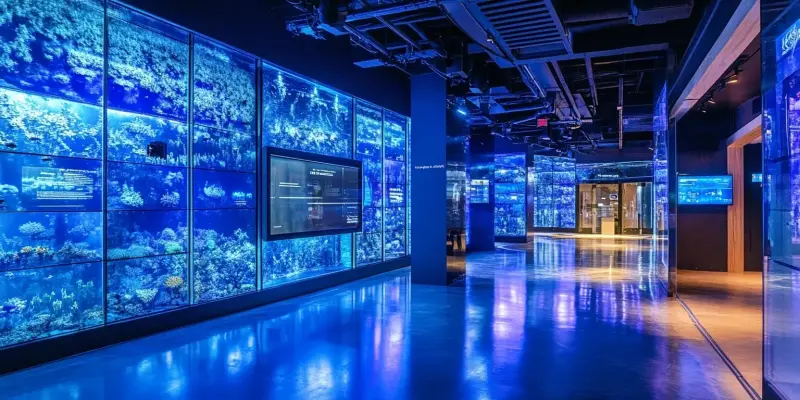Creating immersive customer experiences has become a critical focus for businesses aiming to meet and exceed modern consumer expectations. The transformation of customer interactions in a multifaceted, omnichannel, and immersive world is reshaping the marketing, advertising, and sales landscapes. Customers now place as much value on the experience a company provides as on the products and services offered, necessitating brands to create differentiated and memorable experiences at every touchpoint. As competition intensifies, standing out in the market requires not only offering unique products but also crafting impeccable customer journeys that resonate deeply with consumers.
The Paradigm Shift in Customer Engagement
The dynamics of customer engagement are evolving rapidly, driven by the integration of digital and physical spaces. Leveraging data and analytics, companies now have the ability to customize and personalize interactions in near-real time, effectively meeting today’s consumers’ heightened expectations. This seamless blend allows them to immerse themselves in brand experiences effortlessly, translating into greater brand loyalty and customer satisfaction. The rise of experiential marketing, with budgets expected to increase by 80% in 2024, demonstrates the industry’s commitment to creating memorable engagements.
Technologies have adapted significantly to aid organizations in reimagining customer engagement. The trend toward short-form videos on social media, which 89% of consumers prefer, symbolizes the shift from digital to physical realms, compelling brands to innovate their content presentation in person. This necessitates a holistic approach where digital content dovetails seamlessly with physical experiences to offer a comprehensive engagement. By capitalizing on these modern tools and adapting to the evolving digital landscape, businesses can keep pace with consumer demands and ensure continuous improvement in how they connect with their audience.
The Role of Video in Immersive Experiences
Video integration has emerged as a crucial tool for creating immersive experiences, enhancing the overall ambiance while supporting the brand’s narrative. Instead of being the central focus, video should act as a complementary element that adds value without overwhelming the consumer with lengthy content. This technique ensures that video content enhances the experience, fostering a deeper connection between the brand and its customers. An effective video strategy can play a pivotal role in shaping how consumers perceive and interact with a brand, ultimately driving engagement and loyalty.
Defining clear goals is essential to determine the appropriate technology stack for implementing immersive experiences successfully. While ideating on these experiences is stimulating, the challenge lies in selecting and deploying the right technology to bring these ideas to life. Ensuring positive interactions throughout the customer journey is vital, as negative experiences, such as technical failures, can be detrimental. Businesses must strike a balance between creativity and practicality, ensuring that every tech deployment is aligned with specific objectives and contributes positively to the overall customer experience.
Leveraging Advanced Technologies for Customer Engagement
A hypothetical scenario of a big-box retailer redefining its advertising strategy using digital signage underscores the potential of various technologies. Through the integration of video walls, 3D visuals, sensor-enabled IoT applications, and AI, retailers can significantly enhance customer engagement and drive in-store purchases. These technologies offer innovative ways to capture consumer attention and create memorable experiences, transforming standard retail environments into dynamic spaces that reflect the evolving demands of modern shoppers. Investing in these advanced tools can yield substantial returns in terms of customer loyalty and business growth.
The importance of data in designing immersive experiences cannot be overstated. The proliferation of digital solutions has laid the foundation for advanced experience creation, with technologies like AI, ML, IoT, and sensors generating unprecedented amounts of data. The challenge lies in capturing the right data and utilizing it effectively to enhance customer experiences. Consumers are generally willing to share information in exchange for tangible benefits, such as improved service or enhanced experiences. Properly harnessing this data ensures that businesses can offer personalized and impactful interactions, fostering a stronger connection with their audience.
Practical Applications of Immersive Technologies
A practical example of a sporting arena using AI and sensors to streamline operations and enhance the customer experience highlights the real-world applications of these technologies. By reducing wait times at concession stands, triggering relevant food displays, and utilizing self-serve kiosks to expedite ordering, these technologies can significantly improve operational decisions and offer better experiences for consumers. These innovations not only enhance efficiency but also offer better value to customers by saving their time and improving their overall event experience. As such applications continue to evolve, businesses across various sectors can leverage them to boost customer satisfaction and loyalty.
The overarching trend is the industry’s movement toward digitally powered experiences highly personalized and responsive to consumer needs and preferences. Elevating customer experiences requires collaboration among various stakeholders, including businesses, technology partners, content creators, and IT managers. Staying current with the latest consumer trends and technological advancements is crucial for businesses to remain competitive. By fostering strong partnerships and continuously adapting their strategies, businesses can ensure they effectively meet their customers’ expectations in an increasingly digital world. This collaborative approach enables continuous innovation, keeping brands at the forefront of customer engagement.
The Future of Customer Experiences
Creating immersive customer experiences has become a vital goal for businesses aiming to meet and surpass today’s consumer expectations. The evolution of customer interactions in a multifaceted, omnichannel, and immersive world is reshaping marketing, advertising, and sales landscapes. Today’s consumers value the experience a company provides as much as the actual products and services offered. Therefore, brands need to create unique and memorable experiences at every point of contact.
In this competitive environment, it’s no longer enough to just offer distinctive products. Businesses must also craft flawless customer journeys that make a lasting impact on consumers. This means understanding and anticipating customer needs, embracing technology to enhance interactions, and ensuring every customer touchpoint is engaging and fulfilling. With the market more crowded than ever, companies that prioritize exceptional customer experiences can distinguish themselves and foster loyalty. Ultimately, creating those memorable experiences is essential for standing out and building long-lasting consumer relationships.

